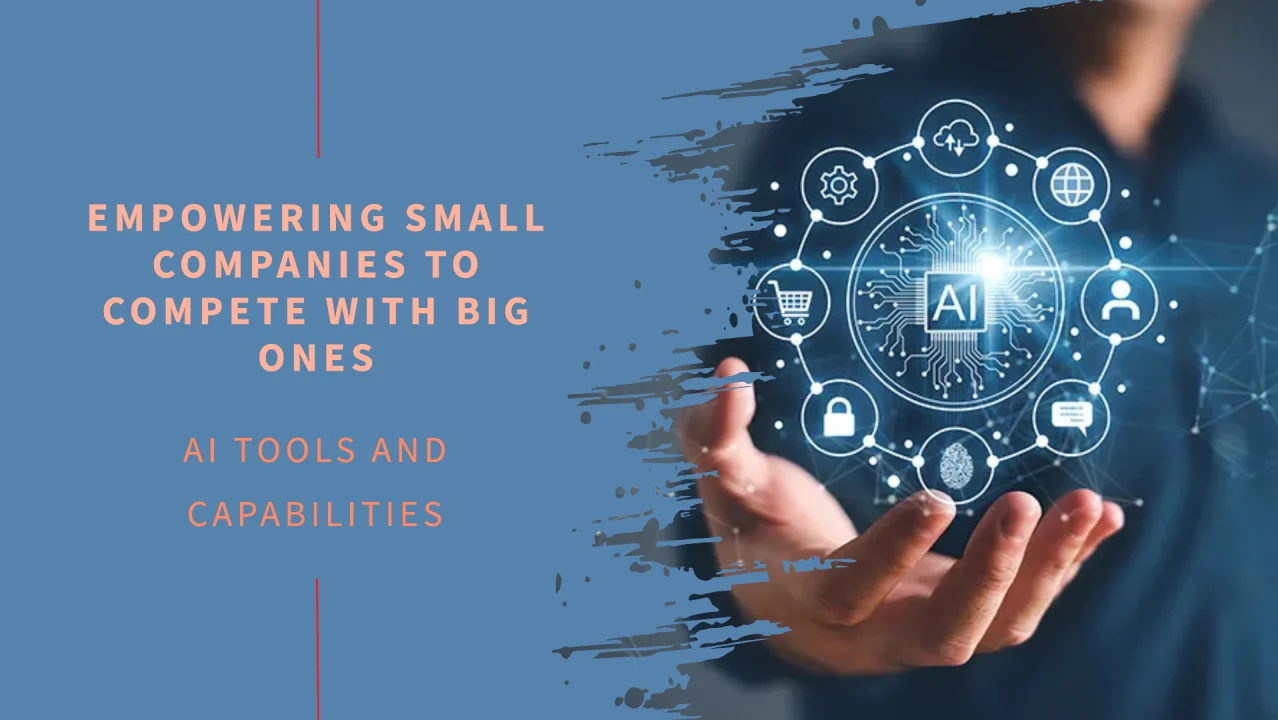Latest Posts
September 11, 2025 Continuing Education in Global Logistics: A Powerful Catalyst for Career Growth
June 30, 2025
Continuing Education in Global Logistics: A Powerful Catalyst for Career Growth
June 30, 2025
 Tariffs: The Upside
June 30, 2025
Tariffs: The Upside
June 30, 2025
 Exploring the Role of Intrapreneurs: Innovation Drivers Within Organizations
Exploring the Role of Intrapreneurs: Innovation Drivers Within Organizations
Newsletter
Sign up to receive email updates from the Freightpath.
"*" indicates required fields
AI Tools and Capabilities: Empowering Small Companies to Compete with Big Ones
June 19, 2024
In today’s rapidly evolving business landscape, the advent of artificial intelligence (AI) has revolutionized how companies operate, innovate, and compete. Traditionally, large corporations held a significant advantage over smaller businesses due to their financial resources, access to cutting-edge technology, and established market presence. However, AI tools and capabilities have emerged as powerful equalizers, allowing small companies to level the playing field in unprecedented ways.
Let’s explore the transformative impact of AI on small businesses, examining how AI tools empower them to compete more effectively with their larger counterparts. We delve into specific AI applications, their benefits, and the strategic opportunities they offer to small businesses across various industries.
Understanding AI Tools and Capabilities
AI encompasses a broad spectrum of technologies that enable machines to simulate human intelligence and perform tasks traditionally requiring human cognitive abilities. These technologies include machine learning, natural language processing (NLP), computer vision, predictive analytics, and more. AI tools leverage vast amounts of data to automate processes, uncover insights, and make data-driven decisions in real-time.
For small businesses, access to AI tools means gaining capabilities once reserved for large enterprises. These tools enable automation of repetitive tasks, enhancement of customer interactions through personalized experiences, and optimization of business operations for efficiency and cost-effectiveness. By harnessing AI, small companies can streamline workflows, improve decision-making, and innovate faster, ultimately enhancing their competitiveness in the market.
Competitive Advantages of AI for Small Companies
1. Enhanced Operational Efficiency
AI-driven automation reduces manual workload and minimizes errors, allowing small businesses to allocate resources more efficiently. Tasks such as data entry, customer support queries, inventory management, and supply chain optimization can be streamlined, freeing up time for employees to focus on higher-value activities like innovation and strategy.
2. Improved Customer Insights and Personalization
AI tools analyze customer data to extract meaningful insights regarding preferences, behavior patterns, and purchase history. This information enables small businesses to tailor their products and services to meet individual customer needs effectively. Personalized marketing campaigns, recommendation engines, and customer service chatbots driven by AI enhance customer satisfaction and loyalty, fostering long-term relationships.
3. Competitive Pricing and Cost Management
AI-powered predictive analytics enable small businesses to forecast demand, optimize pricing strategies, and manage inventory more effectively. By leveraging data-driven insights, companies can identify cost-saving opportunities and allocate resources strategically, maintaining competitive pricing while maximizing profitability.
4. Agility and Innovation
Small businesses often possess greater agility than larger corporations, allowing them to adapt quickly to market changes and customer demands. AI facilitates rapid experimentation and innovation by providing tools for real-time data analysis, market trend identification, and product development. This agility enables small companies to launch new products faster, capitalize on emerging opportunities, and stay ahead of competitors in dynamic industries.
5. Access to Global Markets
AI-powered language translation and localization tools break down language barriers, enabling small businesses to reach international audiences effectively. By understanding cultural nuances and adapting marketing strategies accordingly, companies can expand their market presence without the substantial investment typically required for global expansion.
Case Studies and Examples
1. E-commerce and Retail:
Small online retailers utilize AI-powered recommendation systems to suggest products based on customer browsing history and preferences, increasing sales conversion rates and average order value. Automated inventory management and demand forecasting tools optimize stock levels, preventing stockouts and minimizing excess inventory costs.
2. Healthcare and Biotechnology:
Startups in the healthcare sector leverage AI for drug discovery, genomics research, and personalized medicine. Machine learning algorithms analyze patient data to predict disease risk factors and recommend personalized treatment plans, improving patient outcomes and reducing healthcare costs.
3. Financial Services:
Fintech startups use AI algorithms for fraud detection, credit scoring, and algorithmic trading. Real-time transaction monitoring systems identify suspicious activities, mitigating financial risks and enhancing regulatory compliance. AI-powered chatbots provide personalized financial advice and customer support, enhancing user experience and retention rates.
Overcoming Challenges and Considerations
While AI presents numerous opportunities for small businesses, several challenges must be addressed to maximize its benefits:
- Data Privacy and Security: Safeguarding sensitive customer data is paramount to maintain trust and comply with data protection regulations.
- Skills Gap: Acquiring AI expertise or partnering with AI service providers may be necessary to implement and manage AI tools effectively.
- Ethical Considerations: Ensuring AI applications are used responsibly and ethically to avoid biases and discriminatory practices.
Future Outlook
The rapid advancement of AI technologies continues to reshape the competitive landscape for businesses of all sizes. As AI becomes more accessible and affordable, its adoption among small companies is expected to accelerate, driving further innovation and market disruption. Collaborative ecosystems, where startups and SMEs collaborate with AI developers and researchers, will foster a culture of innovation and knowledge-sharing, propelling small businesses to new heights of success.
Conclusion
AI tools and capabilities have ushered in a new era of opportunity for small businesses, enabling them to compete with larger corporations on a more level playing field. By harnessing AI-driven automation, data analytics, and personalized customer experiences, small companies can enhance operational efficiency, drive innovation, and expand their market reach globally. As AI technologies continue to evolve, small businesses that embrace AI early stand to gain a significant competitive advantage, positioning themselves as leaders in their respective industries.
In summary, while challenges remain, the transformative power of AI empowers small businesses to achieve sustainable growth, disrupt industries, and redefine what it means to compete in a digitally driven world. By leveraging AI tools strategically, small companies can unlock their full potential and thrive in an increasingly competitive marketplace.
CEO @ FreightPath Inc. | CSCMP Corporate Member | We Deploy The Industry’s Most Comprehensive Global Supply Chain Curriculum | 500+ Course Library | gofreightpath.com/course-catalog
